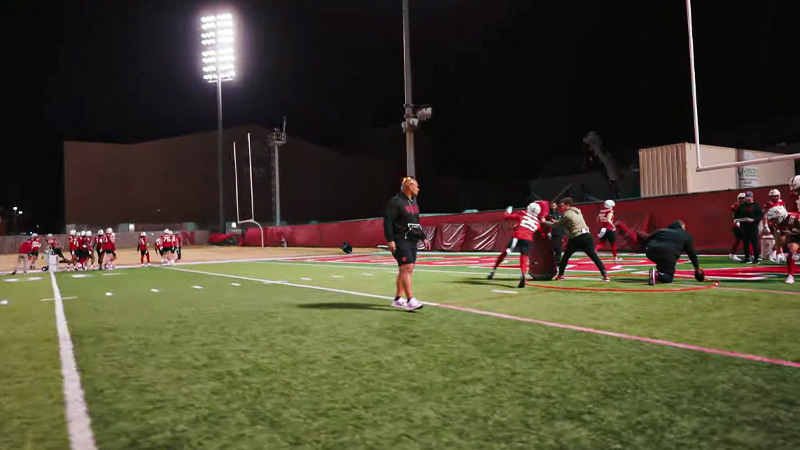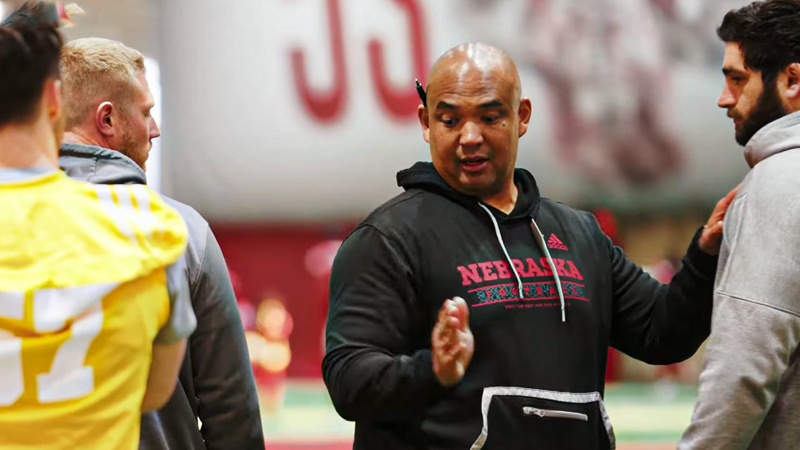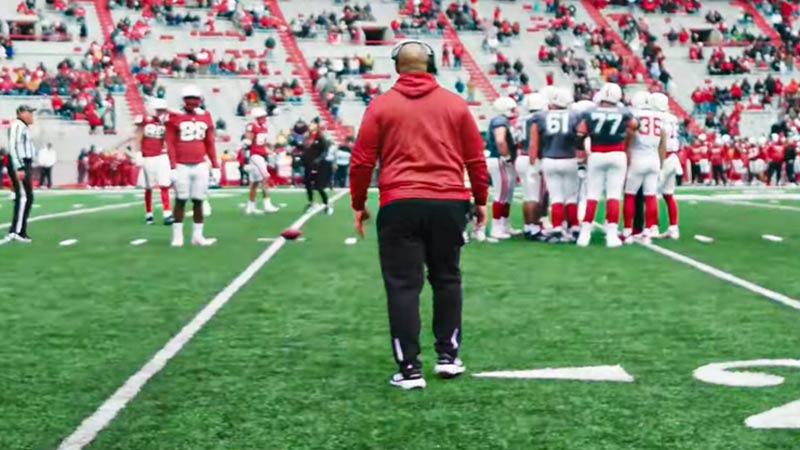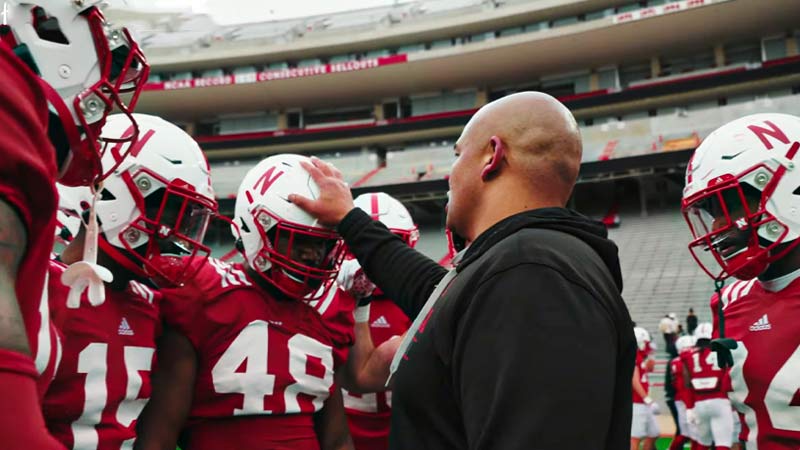In the complex and strategic world of American football, there’s a position that often works behind the scenes but plays a pivotal role in shaping a team’s success on the field: the defensive coordinator.
This mastermind is responsible for designing and implementing the defensive strategies that thwart the opposing team’s plays, creating a strong line of defense that can make all the difference between victory and defeat.
In this blog post, we delve into the realm of American football and uncover the intricacies of what it truly means to be a defensive coordinator. So, stay calm and read till the end.
Who Is a Football Defensive Coordinator?
A football defensive coordinator is a key member of an American football coaching staff, responsible for designing and implementing defensive strategies to counter the opposing team’s offensive plays.
They analyze the opponent’s strengths and weaknesses, develop game plans, and make real-time adjustments during matches.
The defensive coordinator works closely with other coaches to ensure players are aligned with the overall defensive scheme, covering aspects such as pass coverage, run defense, blitz packages, and situational tactics.
Their expertise in understanding offensive formations, player tendencies, and game situations is crucial in orchestrating a strong defense. Effective communication and leadership skills are essential as they guide and motivate players to execute the game plan successfully.
The defensive coordinator’s role requires a deep understanding of the intricacies of the game and the ability to adapt to evolving strategies throughout the season.
Responsibilities of a Football Defensive Coordinator
A football defensive coordinator holds a pivotal role within a team’s coaching staff, shouldering a range of responsibilities aimed at formulating and executing effective defensive strategies. Key duties include:
Game Planning
Analyzing upcoming opponents to identify their offensive strengths and weaknesses, then devising comprehensive game plans to counter their plays and exploit vulnerabilities.

Strategy Development
Creating a cohesive defensive scheme that aligns with the team’s overall philosophy, taking into account player strengths, skill sets, and positional assignments.
Playbook Creation
Crafting an extensive playbook that covers various defensive formations, coverages, blitz packages, and situational tactics to be used throughout the season.
Player Development
Working closely with position coaches to develop players’ individual skills, technique, and understanding of the defensive scheme, fostering a cohesive and efficient unit.
In-Game Adjustments
Making real-time adjustments based on the opponent’s tendencies and the flow of the game, adapting the defensive strategy to counter emerging challenges and exploit opportunities.
Film Study
Analyzing game footage and scouting reports to gain insights into opponents’ play-calling tendencies, formations, and player behavior, enabling more accurate defensive preparation.
Communication
Effectively communicating the defensive game plan, assignments, and adjustments to players during practices and games, ensuring everyone is on the same page.
Motivation and Leadership
Inspiring and motivating players, creating a culture of accountability, effort, and commitment within the defensive unit.
Collaboration
Collaborating with other coaches, especially the offensive coordinator, head coach, and special teams coordinator, to create a cohesive overall team strategy.
Player Evaluation
Continuously assessing player performance, providing feedback, and making decisions about lineup changes and substitutions based on practice performance and game situations.
Scouting Reports
Preparing detailed scouting reports for players, detailing opponent tendencies, key players to watch, and specific plays to anticipate.
Situational Mastery
Developing strategies for handling critical in-game situations such as third-down conversions, goal-line stands, and two-minute drills.
Player Chemistry
Building camaraderie and chemistry within the defensive unit, fostering a sense of trust and cooperation among players. This is a must-have duty for any coordinator.
Staying Current
Keeping up-to-date with evolving offensive trends and strategies to ensure the defensive approach remains effective and competitive.
The defensive coordinator’s role requires a deep understanding of the game’s nuances, exceptional analytical skills, effective communication, and the ability to adapt to changing circumstances both on and off the field.
Strategies to be a Defensive Coordinator

Becoming a successful defensive coordinator in American football requires a combination of football knowledge, leadership skills, and strategic thinking. Here are some strategies to help you pursue a career as a defensive coordinator:
Master Defensive Concepts
Develop a deep understanding of defensive formations, coverages, blitz packages, and other tactical elements. Study different defensive schemes and learn how to adapt them to various opponents and situations.
Gain Coaching Experience
Start by gaining coaching experience at different levels, such as high school, college, or junior teams. This hands-on experience will help you understand the dynamics of coaching and player development.
Study Opponents
Learn how to scout and analyze opponents effectively. Study game film to identify tendencies, strengths, and weaknesses of opposing offenses, enabling you to design specific strategies to exploit their vulnerabilities.
Networking
Build connections within the football coaching community. Attend coaching clinics, seminars, and conferences to learn from experienced coaches and to network with peers and potential mentors.
Continuous Learning
Stay up-to-date with the latest trends, innovations, and strategies in defensive football. The game is constantly evolving, so your willingness to learn and adapt is crucial.
Attention to Detail
Pay meticulous attention to the finer points of the game. Understanding the subtleties of player positioning, timing, and execution can make a significant difference in defensive performance.
Communication Skills
Develop strong communication skills to convey your defensive strategies clearly to players, assistant coaches, and the rest of the coaching staff.
Leadership and Motivation
Be an inspiring leader who can motivate players to give their best effort. Fostering a positive and competitive team culture can enhance player buy-in and overall performance.
Adaptability
Be ready to adjust your game plan on the fly based on in-game developments and opponent adjustments. Adaptability is key to countering unexpected challenges.
Collaboration
Work closely with the offensive coordinator, head coach, and other members of the coaching staff to ensure that your defensive strategies align with the team’s overall objectives.
Attention to Players
Develop personal relationships with your players. Understand their strengths, weaknesses, and personalities to tailor your coaching approach and maximize their potential.
Film Study Mastery
Hone your skills in film study. The ability to break down opponents’ plays and analyze them in detail is crucial for designing effective defensive schemes.
Handle Pressure
Coaching at a higher level comes with increased pressure. Develop mental resilience to handle high-stress situations, make quick decisions, and guide your team to success.
Develop a Philosophy
Craft a defensive philosophy that defines your approach to the game. This will guide your decision-making and help create a cohesive defensive strategy.
Remember that becoming a defensive coordinator takes time and experience. Be patient, stay committed to your development, and continuously seek ways to improve your coaching skills and football knowledge.
Challenges of Being a Defensive Coordinator

Being a defensive coordinator in American football comes with a set of unique challenges that require strategic thinking, adaptability, and strong leadership skills. Some of the challenges include:
Balancing Act
Defensive coordinators must balance their time between devising game plans, studying opponents, coaching players, and collaborating with other members of the coaching staff. Finding the right balance is essential to manage all aspects effectively.
Dynamic Offenses
The evolving nature of offensive strategies and innovative play-calling techniques presents a constant challenge. Coordinators need to stay ahead of offensive trends, ensuring their defensive schemes remain effective.
In-Game Adjustments
Quick decision-making during games is crucial. Defensive coordinators must make adjustments on the fly to counter opponents’ changing tactics and exploit emerging opportunities.
Player Injuries
Dealing with player injuries can disrupt the defensive lineup and require adjusting the game plan on short notice. Developing depth and contingency plans becomes crucial.
Personnel Limitations
Not all players have the same skill sets, and coordinators must adapt their strategies based on the abilities of the players available. Maximizing player strengths and minimizing weaknesses is a constant challenge.
Media and Fan Pressure
Coordinators are often subject to public scrutiny and fan expectations. The pressure to deliver strong defensive performances can be intense, especially in high-stakes games.
Time Constraints
Coordinators have limited time to prepare for each opponent. Effectively analyzing opponents’ tendencies, developing game plans, and teaching players new strategies within a week can be demanding.
Maintaining Consistency
Achieving consistent defensive performance throughout the season is challenging due to the varying strengths of opponents, player fatigue, and potential injuries.
Player Development
Developing players’ skills and understanding of the defensive scheme is an ongoing process. Ensuring all players are on the same page and continually improving is a significant challenge.
Communication
Effectively communicating complex defensive concepts to players from different backgrounds and levels of experience can be challenging. Clear communication is essential for successful execution.
Ego Management
Coordinators must manage egos and personalities among players, ensuring a cohesive and cooperative team environment despite individual ambitions.
Pressure Situations
Critical moments in games, such as fourth-down stops or last-minute drives, demand effective decision-making and strategy implementation under intense pressure.
Adapting to Rule Changes
Changes in league rules can impact defensive strategies, particularly those related to tackling, coverage, and contact. Coordinators must adapt their approaches accordingly.
FAQs
What is the role of a defensive coordinator in American football?
A defensive coordinator is a key member of a football coaching staff who designs, develops, and executes defensive strategies to counter the opposing team’s offensive tactics.
They analyze opponents, devise game plans, make real-time adjustments, and work closely with players and other coaches to ensure a cohesive defensive performance.
What are the primary responsibilities of a defensive coordinator?
A defensive coordinator is responsible for creating defensive game plans, developing playbooks, making in-game adjustments, studying opponent tendencies, communicating strategies to players, fostering player development, and leading the defensive unit with a strong sense of leadership.
How does a defensive coordinator prepare for games?
Defensive coordinators prepare for games by thoroughly analyzing opponents’ offensive tendencies and play-calling strategies.
They study game film, create specific game plans based on opponents’ strengths and weaknesses, and develop schemes that can effectively counter the anticipated offensive plays.
What skills are essential for a successful defensive coordinator?
Successful defensive coordinators possess a deep understanding of football tactics, strong analytical skills, effective communication abilities, adaptability to changing game situations, and the ability to motivate and develop players to execute defensive strategies effectively.
How does a defensive coordinator adapt to evolving offensive trends?
Defensive coordinators need to stay current with the ever-evolving offensive strategies in football. They continuously study new trends, innovative play-calling methods, and rule changes that impact defensive play.
Adapting defensive schemes to counter these trends is crucial to maintaining a competitive edge.
Wrapping Up
Behind every strong defense on the football field stands a skilled and strategic defensive coordinator.
Their expertise and dedication shape the way teams approach each game, providing a solid foundation for players to execute under pressure.
From game planning to in-game adjustments, the defensive coordinator’s role remains integral to a team’s success, highlighting the critical nature of their contributions in the dynamic world of American football. Thank you for your support.







